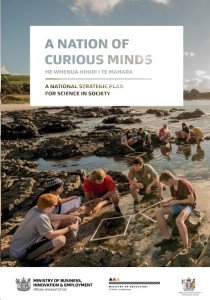A new report from the government lays out a plan to encourage and enable a more science-literate and aware society.
 A Nation of Curious Minds: He Whenua Hirihi I te Mahara – is the blueprint for the Science in Society Project which came out of the National Science Challenges. The project called on the government to “encourage and enable better engagement with science and technology across all sectors of New Zealand society.”
A Nation of Curious Minds: He Whenua Hirihi I te Mahara – is the blueprint for the Science in Society Project which came out of the National Science Challenges. The project called on the government to “encourage and enable better engagement with science and technology across all sectors of New Zealand society.”
The report was launched today by Science and Innovation Minister Steven Joyce and Education Minister Hekia Parata and details a strategic plan developed by the Ministry of Business, Innovation and Employment and the Ministry of Education with close involvement from the office of the Prime Minister’s Chief Science Advisor.
“Science, and the knowledge and innovation that flow from it, plays a critical role in creating and defining our future,” Mr Joyce said in a media release. “As many New Zealanders as possible should be able to respond to the challenges and opportunities science presents, and have the confidence to take part in debates involving science and technology.”
There are three specific goals set for the project over the next ten years:
- More learners who are competent in science and technology and more who go on to a career in science, technology, engineering and mathematics (STEM)-related jobs.
- A more scientifically and technologically engaged public and a more publicly engaged science sector.
- A more skilled workforce and science and technology that is more responsive to New Zealanders’ needs.
To reach these goals the plan lists key areas for action:
- Enhancing the role of education
- Public engaging with science and technology
- Science sector engaging with the public
These three areas are to be linked as part of participatory platform to promote citizen science and involvement from all groups.
Among the programmes to help achieve the goals in the plan are a contestable fund available for projects aimed at engaging harder-to-reach groups and a Science Skills in Education initiative to support schools and teachers to build confidence and access resources to build rich, exciting science programmes.
You can read the full report and background documents here.